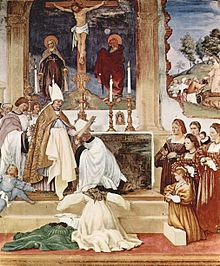Адрес командовал

Oratio Imperata ( латынь , «Обязательная молитва») - это набор римско -католических молитв, состоящих из литургического действия и короткой общей молитвы, в которой местная обычная или предварительная церковь может публично молиться, когда возникает серьезная потребность или бедствие. [ 1 ]
Общие причины религиозного вызова молитвы - это естественные бедствия, такие как штормы , снег и засуха, в то время как редкие обстоятельства, которые заслуживают молитвы, являются войны , чума и нарушение общественного мира в обществе. [ 2 ] Молитвы обычно вызываются архиепархией от имени подавляющих популярных запросов и уполномочены высокопоставленным предварительным или столичным архиепископом . [ 3 ]
История
[ редактировать ]Обычная традиция чтения таких молитв коренится в апостольской эпоху , когда миряне просили помощь и помощь своих епископов во время естественного бедствия, войны или любой серьезной общественной опасности для общества. В средние века различные святые (например, Святой Исидор Фермер ) были призваны за помощь в предоставлении дождя, в то время как Сент -Роч был призван для ужасных бедствий и черной чумы .
Present Catholic discipline allows that any collect prayers from the Mass may be prescribed by the local ordinary as this type of prayer.[4] The prayer itself cannot be a permanent religious recitation, but rather only for used for a short period of time of need. The prayers are often recited postcommunion or after the conclusion or final benediction of the Mass. When the prayer itself is asked, composed, or canonically authorized by the Pope, it can also merit a plenary indulgence.[5]
The invocative prayers prescribed as Oratio Imperata:
- Must only be composed of one, singular prayer
- Must be primarily addressed to a personage of the Holy Trinity, not directly to any interceding angel, saint, or a title of the Blessed Virgin Mary
- Must be prayed and recited by all Catholic priests celebrating Holy Mass in their respective churches and oratories, as well as exempted ones of the diocese
- Can never be said under a single conclusion with the collect of the Mass, but after the Mass is concluded;
- Is prohibited on all first and second classes of liturgical days, in votive Masses of the 1st and 2nd class, in sung Masses, and when they all have been met on that particular day.
- An oratio imperata for the deceased is said only on Ferias of the Fourth Class and in low votive or Requiem Masses of Class IV.
In very rare cases of enduring public calamities lasting a longer time, (i,e. national war, calamitous plague, etc.), the local ordinary may indeed impose a suitable Oratio Imperata for an extended period:
- May only be recited during Mondays, Wednesdays, and Fridays.[6]
- Is prohibited on the same days twice, or on the same days coinciding with relevant liturgical days.
Difficulty of approval
[edit]At times, the approval to recite the prayers on a diocesan level has been known to be difficult to obtain, usually causing the faithful to rather demand in large numbers to an archdiocese to release an Oratio Imperata. The most commonly authorized prayer is Oratio Imperata Ad Fluviam Petendam, in hopes of asking for rain in times of severe drought. Another one is Oratio Imperata Ad Calamitam et Bellonam, for casualties of war.
In the Philippines, the release of such prayers is often requested during the monsoon season, and their issuance by high-ranking prelates, such as the Archbishop of Manila and the Archbishop of Cebu, is primarily reported in various national media outlets.[7] Obligatory prayers were also instructed by the Catholic Bishops' Conference of the Philippines to be recited during the COVID-19 pandemic on selected regional radio and television stations[8][9] as well as amidst escalating geopolitical tensions in the South China Sea.[10]
Within the Archdiocese of Los Angeles in June 2008, a special prayer for the request of more priestly vocations merited the request for the prayers, recited post-communion during Sunday Masses in the San Fernando Valley but was prohibited in being prayed during weekly masses.
References
[edit]- ^ "CatholicReference.net : Catholic Dictionary : ORATIO IMPERATA". www.catholicreference.net. Archived from the original on 2007-08-25.
- ^ Modern Catholic Dictionary. Father John Hardon. Eternal Life Publications.
- ^ "Oratio Imperata para sa Paghinto ng Ulan at Baha". Archived from the original on 2015-09-24. Retrieved 2012-08-24.
- ^ «Филиппинская звезда >> нация | philstar.com» . www.philstar.com . Архивировано из оригинала 2014-12-17.
- ^ http://www.mb.com.ph/node/245759/cardinal-vidal-urge [ мертвая ссылка ]
- ^ Название статьи [узурпировал]
- ^ http://www.rcam.org Archived 2006-02-18 на машине Wayback -Фронтальная страница
- ^ "Oratio Imperata for protection against COVID-19 (Revised January 28, 2022)"Полем
- ^ (Oratio Imperta Covid 19 - пересмотрен 28 января 2022 года (PDF) .
- ^ Барон, Габриэла (22 июля 2024 г.). " Для мира "Oratio Imperatio Imperata Daily Tribune Архивировано из первоначального 22 июля , Ретривер 20242024